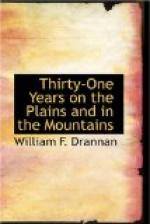CHAPTER XXXIV.
Massacre of the Davis family.—A hard ride and swift retribution. —A pitiful story.—Burial of the dead.—I am sick of the business.
We remained here for some weeks yet, piloting and escorting emigrants through the mountains, but having very few scraps with the Indians. When the emigrants quit coming and our provisions had run very low, we made preparations to return to Fort Yuma. But to make sure that no more of the crawling trains would be winding along that way this season, myself and another scout, with two days’ rations, started on a little scurry eastward. But a tour of four days developed no further sign of emigrants or Indians, so the scout and I returned to find the command all ready to start. We were just about taking up the line of march for Yuma when a teamster on his way to Phoenix with a load of freight, drifted into camp and informed us to our horror, that the Indians had attacked the Davis ranch, killed the old man and his two sons, treated the old mother and the two daughters shamefully, and then pillaged the place and drove off all the stock.
I had no sooner ridden into camp that night than an orderly came and took my horse and said: “Lieut. Jackson wishes to see you at his tent immediately.” I knew that there was something very unusual the matter or he would not have called me to his quarters until I had had my supper. On approaching his tent I saw that he was much excited. He told me what was up, and said it was strange the Indians would come down there that season of the year and commit such depredations as that. After he had laid the whole matter before me just as he had it from the teamster, he said: “Send the very best men you have on their trail.” I told him I would go myself and take George and two other men with me.
I was convinced before finishing my talk with him that it was not the Indians that had committed the depredation, but that I kept to myself.
Just as I walked out of the Lieutenant’s tent I met George and told him that we had a long night’s ride before us, to pick out two of the best men we had, also to take the best horses—we had, and to change my saddle to Black Bess from the horse that I had been riding that day. I also gave orders to have everything in readiness by the time I was through supper, which did not take long, although I was very hungry. The boys were all on hand by the time I was through eating, and we mounted and rode away for the Davis ranch. The way we had to go to reach the ranch was about twenty miles down grade and inclined to be sandy all the way. We were all well mounted and we scarcely broke a gallop until we reached the Davis place.
A pitiful sight was there. The old lady and her three daughters had carried the old gentleman and two boys into the house and laid them out on benches in the best manner possible, and to say that it was a heart-rending scene does not begin to express it.




